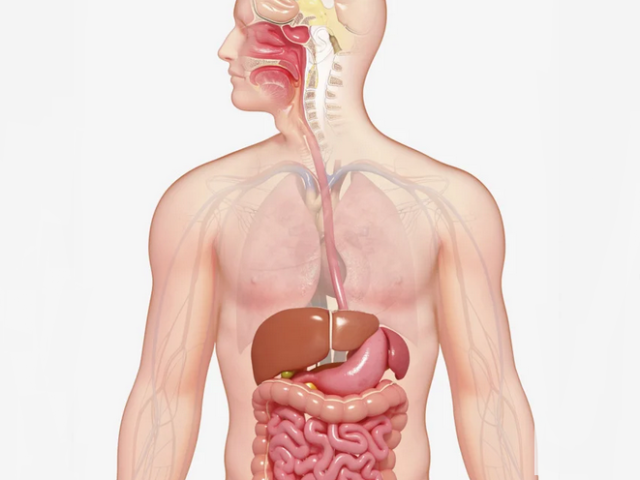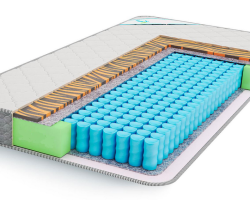Processing of food in the digestive tract consists in the breakdown of food substances into components, which subsequently pass the stage of absorption by the body and will participate in metabolism. This time -consuming process is called digestion. Getting the pleasure of eating food is not priority, the main task of food should be considered to maintain the tone of the body, to promote its correct functioning.
Read on our website another article on the topic: "How to improve digestion?". You will learn about drugs, enzymes, herbs and products to accelerate digestion.
The composition of food is heterogeneous in content, it includes plant and animal proteins, simple and complex carbohydrates (including fiber), saturated and unsaturated fats, fat-and-soluble and water-soluble vitamins, mines. Substances or minerals and water. Let's look in detail where the process of absorption of nutrients occurs and how, as well as what is the digestive process in general. Read further.
Content
- The human digestive system: what is it, what are its functions?
- The value of digestion
- Digestive organs: where is the digestion of food, splitting proteins?
- The process of digesting food in the digestive system
- Digestion of man: where is the absorption of nutrients into the blood?
- In a healthy body is a healthy mind: why is the health of the gastrointestinal tract important?
- Proper nutrition: the key to good digestive system work
- Video: Anatomy. Digestion and absorption
- Video: digestion. As and how long does the digestion process last.
- Video: digestion in the intestines. Hypotage absorption. Biology video tutorial 8th grade
The human digestive system: what is it, what are its functions?
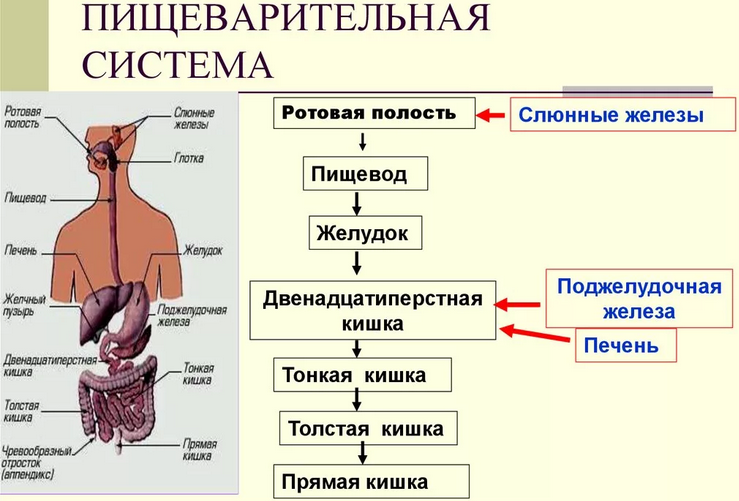
Continuous chemical reactions arising in the body with the aim of maintaining it, called metabolism, create a systematic need to replenish with nutrients. A complex of transformation of the accepted food - digestion - allows you to maintain the energy value of food consumed. What is digestion, what are its functions?
- The human digestive system, which includes the gastrointestinal tract and auxiliary organs, ensures digestion.
Given these factors, the question arises: where is the breakdown of food and absorption of nutrients into the blood? To answer this question, it is necessary to consider the meaning of digestion, as well as the organs themselves. Read further.
The value of digestion
The digestive value is great, since in its process the food components retain their plastic and energy energy. Then they are transformed into the nutrients that are easily digestible by the body, necessary for energy and building material for the growth, development and renewal of all cellular structures.
Digestive organs: where is the digestion of food, splitting proteins?
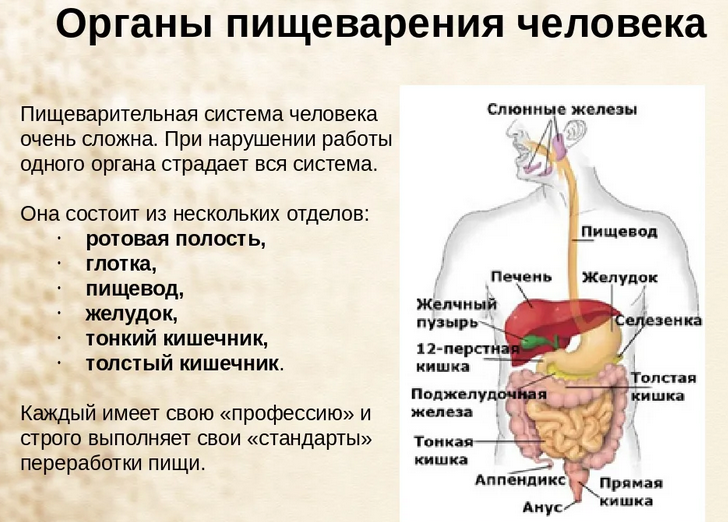
It is worth noting that the digestive organs are actively involved in the mechanical and chemical processing of food. products. Where is the digestion of food and protein splitting?
The digestive system includes:
Glands:
- Salivary
- Parotid
- Submandibular
- Long -language
- The pancreas
- Pancreatic duct
Guts:
- Twelve
- Collapse
- The transverse collapse
- Rising collapse
- General bile duct
- Iliac (thin intestine)
- Blind
- The downward collar
- Rectum
Other important bodies and components:
- Oral cavity
- Pharynx
- Language
- Esophagus
- Stomach
- Liver
- The gall bladder
- Appendix
- Anal hole
Together, these organs are three functional parts of the digestive system: front, middle, rear departments.
The process of digesting food in the digestive system
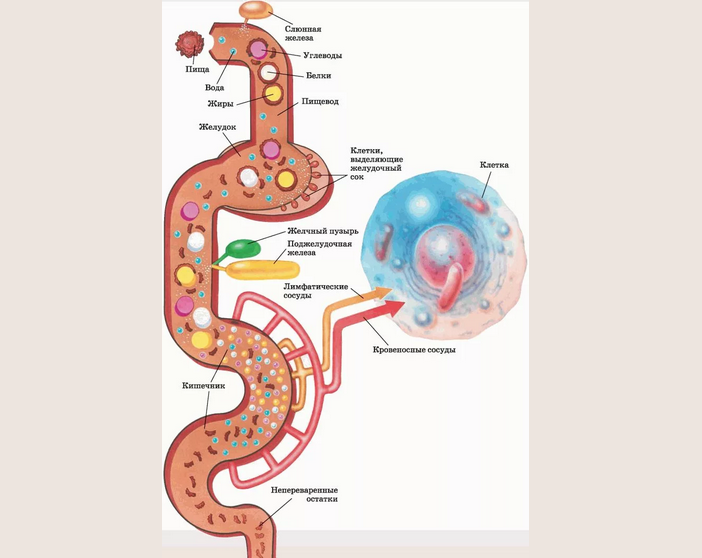
When food enters the oral cavity, where it undergoes thoroughly grinding with teeth, the process of digesting food in one of the most important body systems - digestion begins.
A person is able to distinguish between the taste characteristics of food products thanks to special receptors located in the tongue. It helps to push the food further, wetting the saliva. There is a breakdown of food, the path of which is as follows: a sip, esophagus and stomach. In turn, saliva includes:
- Water
- Mucins (give saliva to viscosity and stickiness)
- Lizocym (kills microorganisms)
- Amylase (splitting starch to glucose)
The stomach is located between the esophagus and the duodenum. Its structure begins with the esophagus, then passes to the radical sphincter, bottom and body of the stomach, folds of the mucous membrane (villi) that contributes to the pushing of food and ends with the sphincter of the gatekeeper.
- The main food department. tract, in which food gets from the mouth, is the stomach. It is in it that the food is mixed with hydrochloric acid containing gastric juice and is prepared for digestion. The digestive process that began in the mouth and stomach continues in the intestines.
- After the stomach of food should be in a loop of a thin 12 pepper intestine, in which there are ducts of two large glands - liver that releases bile and pancreas that releases juice.
- This is followed by the next intestinal section - the small intestine. In her juice there are different enzymes that participate in the final processing of food. substances. Here, the absorption of food splitting products in the bloodstream is performed. substances.
The lowest department of the colon is the rectum, from which naturally in the process of defecation, the undigested food remains coming from the skinny intestine to the thick.
Digestion of man: where is the absorption of nutrients into the blood?
It is worth noting that in the mouth and esophagus, such beneficial vehicles as amino acids, simple sugars, fatty k-you and glycerin are practically not absorbed. Where is the absorption of nutrients into the blood?
- Water, glucose and salts are partially absorbed in the stomach, and in the large intestine - water and some salts.
- To absorb nutrients for humans, a skinny intestine is important, the mucous membrane of which plays a huge role thanks to villi containing vessels - lymph and blood.
- Food before the body absorbs many stages of digestion, is under the influence of various digestive organs, glands and juices.
So, the digestive process originates in the mouth, where carbohydrates break down under the influence of saliva. In the stomach, with the help of special juice, the splitting of fats, proteins and carbohydrates occurs. This process ends under the influence of the enzymes of the pancreas and intestinal juices and bile. In the skinny intestine, organic substances turn into low molecular weight, which subsequently absorbed into the blood flow.
In a healthy body is a healthy mind: why is the health of the gastrointestinal tract important?

The infinite variety of food products does not guarantee the usefulness that they will be qualitatively digested by the body. It is known that a lot depends on how a person eats: his well -being, mood, figure and, most importantly, health. Everyone knows the proverb: "In a healthy body - a healthy mind." Why is the health of the gastrointestinal tract so important?
There are many gastrointestinal diseases:
- Ulcerative diseases of the stomach and duodenum
- An irritated intestine syndrome
- Cholecystitis
- Gastritis
- Pancreatitis
- Dysbiosis and others.
There are many causes of diseases of the gastrointestinal tract. These include:
- Improper nutrition
- Bad habits
- Medications
- Infection
The body may lack vitamins, and frequent stress, poor ecology, non -compliance with personal hygiene, hard physical labor, a sedentary lifestyle - all this affects the digestive system, respectively, and the occurrence of diseases.
You can prevent some diseases by observing several simple rules:
- It is necessary to listen to your body, do not abuse salt, fried, spicy food.
- For meals, you need to allocate a certain time, try not to eat "on the run."
- Proper nutrition is the key to a good life in which there is no place for diseases and a bad mood.
- Food must be consumed slowly, thoroughly chewing every piece.
- Remember: for good digestion you need fiber contained in vegetables and fruits.
Medical practice shows that the following symptoms of gastrointestinal diseases can be distinguished:
- Diarrhea (conclusion of feces containing a lot of water and not having a normal shape)
- Gas formation (excessive swallowing of air)
- Constipation and obstruction of the intestine (rare release of feces)
- Changing appetite and weight
- Nausea
- Heartburn
- Stomach ache
Problems of early diagnosis and timely monitoring of the effectiveness of the treatment remain the most important problems of modern medicine.
Proper nutrition: the key to good digestive system work
A healthy lifestyle involves a person compliance with proper nutrition rules. It must satisfy the needs of the body, not to be completely replaced by vitamins and additives. This is the key to a good digestive system.
Important: Plant food is better than an animal is absorbed by the body. When choosing a diet and diet, you need to take into account your physical data, age, mental and physical activity.
The food that a person consumes should carry the energy value corresponding to the energy costs of a person, so that the digestive process is most qualitative. The food consumed by a person should be varied and useful. Significant quality and energy value of the products used. The method of cooking food (boiled, steamed), conditions, multiplicity and time of meals, high -speed and diet are important.
The consumption of the required volume of water per day (at least 2 liters) also deserves much attention. The significance of water is extremely great, it normalizes digestion, helps to better absorb food, provides free blood circulation, helping to distribute oxygen and nutrients in all organs and systems of the human body.
The use of whole products should contain 80-90% of the diet. These include:
- Groups
- Cereals
- Vegetables
- Fruit
- Eggs
- Meat
- Fish
- Dairy
- Nuts
- Oils
As already mentioned, the lack or excess of certain nutrient components can be expressed in some inconveniences for humans, and subsequently the risk and development of various diseases. Observing the principles of proper nutrition, you can maintain your figure, physical and mental health.
In conclusion, it is worth noting that it is important to remember that a violation of digestive processes can lead to a failure of the entire digestive system. The work of the gastrointestinal tract consists in the breakdown of food into the simplest compounds, which are absorbed into the human lymph. From this it follows that the body receives energy and material for building new cell tissues.
Digestion affects human life, so we must be attentive to food consumed, observe the rules of proper nutrition and lead a healthy lifestyle. Spend your time not on the identification and elimination of various diseases, but on an active life filled with joy.
Video: Anatomy. Digestion and absorption
Video: digestion. As and how long does the digestion process last.
Video: digestion in the intestines. Hypotage absorption. Biology video tutorial 8th grade
Read on the topic:

